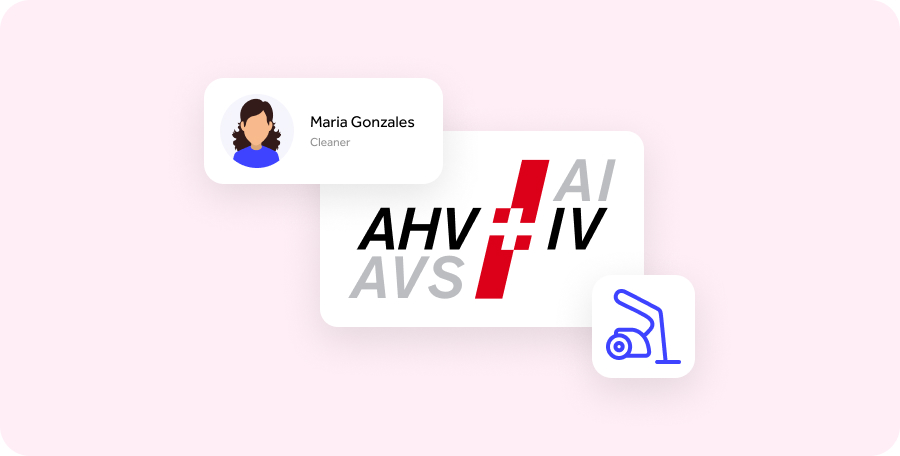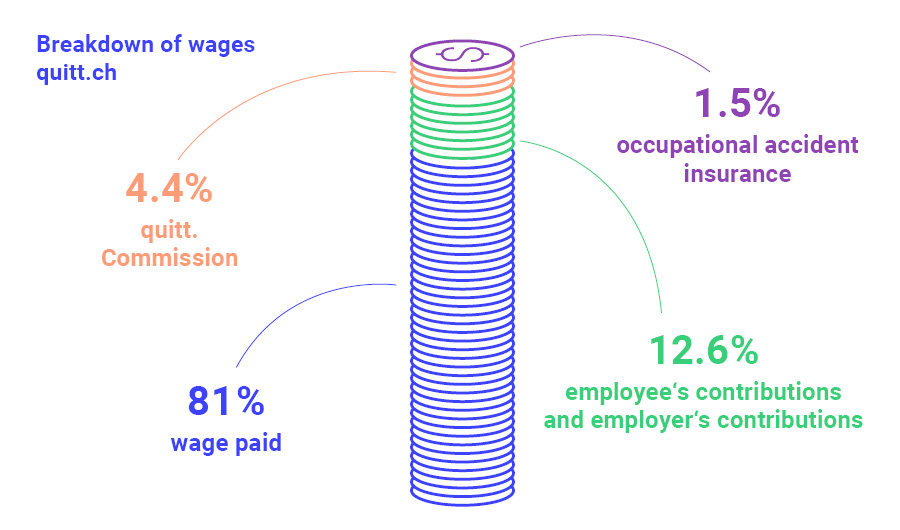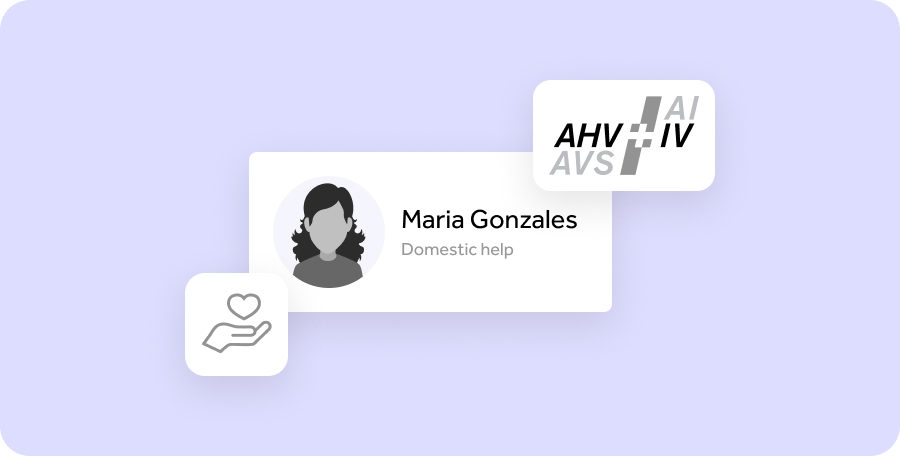It is no secret that illegal employment is widespread in the private sector. Many cleaning ladies and domestic helpers work…

Register a cleaner with the OASI: What you need to know
This is what it’s all about
- Domestic workers are subject to Old-age and survivor’s insurance (OASI) from the first minute of their working time. However, there are two exceptions.
- Undeclared work is punished with fines and in serious cases with imprisonment.
- Domestic helpers must be registered and accounted for with the compensation fund, insurance and, if necessary, the pension fund.
Anyone who employs a cleaner or other domestic help in their home automatically becomes an employer. And every employer has to register his employees with the OASI – regardless of their payroll or level of employment. An employer must therefore also register his cleaning helper with the OASI and insure her/him against accidents, even if she/ he only cleans the household for two hours per month.
Undeclared work is no trivial offense
The Old-age and survivor’s insurance is the most important pillar of social security in Switzerland. It is intended to cover the basic financial needs of workers in old age or in the event of death. Anyone who does not register their domestic help with the OASI and does not take out accident insurance is liable to prosecution.
The disadvantages:
- Sanctions, fines and imprisonment if the illegal employment relationship is discovered.
- The employer is not insured against accidents. Should an accident at work occur, the employer must pay the consequential costs of the accident.
- All OASI benefits including interest on arrears must be paid retroactively.
Social security, protection against the consequences of invalidity and unemployment and a pension after retirement are available to all. Black work puts these social achievements at risk. Undeclared work has many negative effects, such as:
- Loss of revenue to the State and social security funds
- Impairment of the insured persons’ entitlement to benefits
- Wage dumping and exploitation of workers
Where do I have to register my cleaner?
- Compensation fund (social security contributions such as OASI/etc.)
- Insurance (For occupational and non-occupational accident insurance)
- Daily sickness benefit insurance (recommended)
- Pension fund (from CHF 22’050 salary per year, update 1.1.2023)
It is also important to sign a proper employment contract with the domestic help and to pay a fair wage.
OASI contribution obligation for cleaning staff
In addition to registering for OASI, the employer must pay social security contributions for the cleaner and sign the compulsory accident insurance. The premiums for compulsory accident insurance are collected directly by the chosen accident insurer. In addition to the OASI contribution and the premium for accident insurance, the following additional contributions are payable:
- Disability insurance
- Income replacement scheme
- Unemployment insurance
- Family compensation fund
Employees’ contributions are deducted by the employer from each wage payment and transferred to the relevant compensation fund together with the employer’s contribution.
Exceptions to the OASI obligation
- Pensioners
In Switzerland, the normal retirement age is 65 for men and 64 for women. Cleaning women or domestic helpers who have already reached retirement age are entitled to a wage-free allowance of CHF 1’400 per month or CHF 16’800 per year. Contributions to the OASI, IV and EO must only be paid from wages above this allowance. At retirement age, unemployment insurance is completely cancelled. - No OASI obligation for pocket money jobs
Another exception for registration with OASI concerns private domestic workers – including cleaning ladies – who are under 26 years of age. Anyone employed in a private household and earning less than CHF 750 per year is exempt from the obligation to pay contributions. As a rule, this applies above all to domestic workers such as babysitters. The annual income of a cleaning woman is usually considerably higher than 750 francs a year. If you register your cleaning lady with the OASI correctly, you will be able to work legally. We explain the most important labour law principles and terms relating to the employment of a domestic help in detail in our glossary.
Two billing methods
The simplified billing procedure
The simplified billing procedure was developed especially for domestic helpers and cleaning staff. It is part of the Federal Act on Measures to Combat Undeclared Work (BGSA). Irrespective of the employee’s residence status or nationality, the income earned is directly taxed at a flat rate of 5 per cent in this procedure. Important to know: The simplified accounting procedure can only be applied to cleaning women and domestic helpers whose gross wages do not exceed 22’050 Swiss francs per year (update 1.1.2023). This wage is no longer to be declared in the tax return at the end of the year. This is followed by a certificate from the compensation funds, which can be enclosed with the tax return.
The ordinary billing procedure
If the above criteria for employment in the simplified settlement procedure do not apply, the employment relationship must be declared in the ordinary settlement procedure. In contrast to the simplified procedure, in the regular procedure any withholding tax must be settled directly with the cantonal tax office.
Insurance for domestic workers
Statutory duty: accident insurance
It is compulsory to take out an accident insurance policy for domestic help. Anyone working eight hours a week or more for the same employer must also be compulsorily insured against non-occupational accidents.
- Occupational accident insurance: covers accidents at work.
- Non-occupational accident insurance: covers accidents during leisure time. Compulsory from 8 hours per week.
Useful daily sickness benefit insurance
The conclusion of a daily sickness benefit insurance for domestic help is voluntary, but recommended. It protects the domestic help against loss of income due to illness. If a domestic help earns more than CHF 1’837.50 per month or more than CHF 22’050 per year (update 1.1.2023), the employer must also register the employee with a pension fund.
Gross wage, cash wage, net wage?
Gross wage is the wage from which employee contributions such as OASI, IV, EO, ALV are deducted. As the employer, you pay the net wage to the employee. It is calculated by deducting social insurance contributions, unemployment insurance, non-occupational accident insurance and, if applicable, contributions to occupational pension schemes from the gross wage. The net wage is often also referred to as the cash wage.
Tip: With our free wage calculator you can quickly calculate your wages with just a few clicks, taking into account all deductions.

quitt saves time and nerves
Those who do not understand this text or want to avoid the big bureaucratic effort can delegate all the paperwork to quitt. The quitt team takes care of OASI registration and payroll accounting for employers with just a few clicks and details. quitt also takes out inexpensive accident insurance for domestic helpers and, if necessary, takes care of registration with the pension fund. quitt also provides you and the cleaning lady with documents such as the monthly payroll and the employment contract. quitt also helps you by e-mail or telephone with any open questions about the employment relationship.


This Post Has One Comment
Comments are closed.




My brother suggested I might like this website. He was totally
right. This post truly made my day. You cann’t imagine just
how much time I had spent for this info! Thanks!